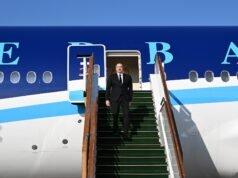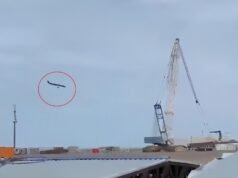The Baku International Sea Trade Port, which is being constructed in Alat settlement of Baku, is steadily developing and attracting new partners to the Free Trade Zone within its territory.
Austrian companies also show interest in the Free Trade Zone created in the Port of Baku.
Azerbaijani Ambassador to Austria Ghalib Israfilov told Trend that transport sector for Austrian companies is now the main area for investments in Azerbaijan.
“Given that Azerbaijan has chosen reformation of the economy, modernization of transport infrastructure, creation of a number of technological and industrial parks, we hope to involve more Austrian companies in cooperation with Azerbaijan,” the ambassador said.
Azerbaijan, considered as the bridge between Europe and Asia, offers great transit opportunities and a wide range of economic priorities. In this regard, the Port of Baku makes Azerbaijan`s transport sector more attractive to world countries.
The Free Trade Zone in the Port is expected to start to operate in 2017. The free trade zone is expected to bring up to $1 billion just in the first few years. Special tax and customs policy, which will be pursued in the territory of the free trade zone will also stipulate further development and simplification of a number of procedures.
Austrian businessmen also have a high interest in cooperation in the field of tourism, in particular, in the construction of hotels, according to Israfilov.
Representatives of business circles in Austria also see good opportunities for investment in the agricultural sector, which includes the production, processing and packaging of finished products.
Considering the attractiveness of the Azerbaijani economy, its constant improvement and development, more and more Austrian companies are showing interest in economic cooperation, the ambassador said.
As for Azerbaijan’s investments in Austria, the diplomat said that despite passivity, Azerbaijani investments are still present in the tourism sector, which is currently booming and amounts to 10-12 percent of Austria’s GDP.
“The great distance between the two countries is that Azerbaijani companies are more involved in regional projects and are oriented to the markets of neighboring countries, in particular Turkey, Russia, Iran, Georgia and Central Asia. Moreover, the existence of certain requirements for entry into the European market, which are necessary to overcome, create certain difficulties for closer cooperation in the field of investment, but all these issues are solved, and we just need to improve the approach,” he said.
Speaking about trade relations between the two countries, Israfilov noted that the highest level of trade turnover between the two countries was registered in 2015, when it exceeded half a billion euros (525 million euros). Oil products accounted for most of the turnover structure (about 60 percent), as well as non-oil products-agricultural, machine-building, and petrochemical products.
Last year, the volume of trade between the countries amounted to 150 million euros, there was a decrease of 20 percent compared to the same period in 2015. The decline in the volume of trade was affected by the economic crisis, both in the Austrian market and in the world as a whole and the decline in oil prices.
The trade turnover between Azerbaijan and Austria amounted to $59.9 million in January-May 2017, according to the State Customs Committee of Azerbaijan, as compared to the same period of 2016 the trade turnover increased by $3.4 million, or 6 percent.





